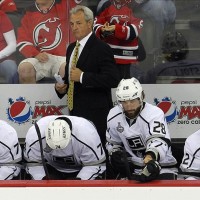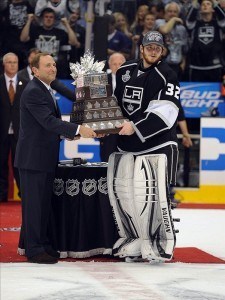It’s all over. The puck dropped just after 7:00 in TD Garden and the final whistle blew just past 10:30 at the Staples Center. The goals, saves, hits, injuries, controversies, disappointments, and triumphs all came to a close on Monday. The Los Angeles Kings routed the New Jersey Devils in Game 6 to capture the franchise’s first Stanley Cup. With the entire team contributing, it seemed as if there was no stopping the surprise powerhouses. And ultimately, there wasn’t. Los Angeles finished the postseason with a 16-4 record, good enough to capture Lord Stanley’s mug.

Backtrack to April, and there was but a small minority of the hockey-watching population that legitimately believed the Kings would win the Stanley Cup. The offseason of 2011 started with optimism by signing Simon Gagne and trading for Mike Richards. Things began to go downhill from there. Beginning with the impending feeling that Drew Doughty was going to sit out the year (and ultimately signed a ridiculous contract), its climax occurred in January when the team had to depend on Jonathan Quick to be their savior. The Kings couldn’t score, couldn’t skate, and couldn’t compete. Rumours arose that captain Dustin Brown was being aggressively shopped and a trade was inevitable. As clearly seen by their cup run, there was no doom in Hollywood. Daryl Sutter was brought in as coach and led the Kings to a stellar record. General Manager Dean Lombardi traded for Jeff Carter and saw Mike Richards benefit as a result. Brown played like a new man, Doughty looked more confident, Kopitar returned to form, and Quick continued to be stellar. The team rode its success into the playoffs, showing it by knocking off the Canucks, Blues, and Coyotes. Only the Devils stood in their way of the ultimate prize, and the Kings managed to dominate them in nearly every way.
Starting on May 30th and ending on June 11th, the Los Angeles Kings and New Jersey Devils put everything on the line to try and win it all. However, many people felt as if the series was “boring” and refused to watch. All the standard narratives were in full effect: “Both these teams are defensive minded and no fun to watch.” “The neutral zone trap the Devils play make for boring games.” “The Kings and Devils have no rivalry and therefore cannot display exciting hockey.” All of those phrases were constantly uttered when they could not be farther from the truth. On the surface, this final was as far from the 2011 final as matchups could be. There was no fingerbiting, or injuries, or inconsistent goaltending, or a riot after it was all done. It was just good, fast-paced hockey that people failed to recognize, as it was easier to look at the low scores and claim it was uneventful. Really, the Kings and Devils provided tons of entertainment in different areas that won’t be shown on the news.
If you did not watch the games because they appeared to be boring, you missed out. The Los Angeles Kings and New Jersey Devils supplied some of the most entertaining hockey seen all year, without all of the theatrics and gimmicks. While some feel it was a forgetful final, the overlying themes present in the series provided enough of a base to create an amazing story. The teams took it from there. If you missed the series, you missed out on a very memorable matchup that had a little bit of everything.
First off, a question needs to be asked: What makes a series “boring”? That adjective is very broad because it’s all relative. What’s boring to one might be exciting to another. Typically, a “boring” hockey match consists of:
- A lack of rivalry between the two teams involved
- A lack of importance in the game
- Few shots, goals, or big saves
- Slow-pace
- A lack of storyline
So if those are what usually are associated with boredom, exciting matches often occur when the opposite of what is listed above occurs. If a game has lots riding on its shoulders between two fast-paced rivals who had a close game in their previous matchup that ended 5-4 in overtime, it has the potential to be an amazing game. For some reason, nobody associated the Los Angeles Kings or New Jersey Devils as exciting for their less-than-reputable past as “boring” teams. The Kings were finished their season with approximately ten percent of all games ending in a 1-0 score. The Devils mastered the neutral zone trap for well over a decade. Regardless, that is not what the teams were in May. Los Angeles had become one of the fastest-paced offenses in the league gaining speed and mustering many shots. New Jersey emerged as one of the strongest forechecking teams in the NHL and started to drift away from their former image as a defensive-minded hockey club.
The 2012 Stanley Cup Final arguably had the greatest storylines of any final post-2005. On the West Coast, the Kings were trying to become the first 8th seed to ever win the cup, and the first team to defeat all three division winners en route to winning the cup. This all had to be done with a new coach and a roster with many AHL call-ups, such as Jordan Nolan and Dwight King. There was also the storyline consisting of Richards and Carter, the two buddies shipped out of Philadelphia for rumours of incessant partying and endless controversy. Despite being the faces of the franchise, both Mike and Jeff landed in Hollywood and made the best of their situation, making it to the big dance once again. In the tri-state area, Martin Brodeur was attempting to become the first goalie in 44 years to win the championship as a goaltender over the age of 40. If that wasn’t enough, superstar Zach Parise is scheduled to become an unrestricted free agent in a few weeks, and the final was likely the last time to see Zach wearing the Devils’ logo. Boring? Hardly.
Taking a Devil’s advocate approach to the argument, the amount of goal scoring (or lack there of) is a large reason why the series appeared to be uneventful. However, quality is better than quantity and the quality of goals were outstanding. Feel that pure snipes are the greatest goals? Henrique did that. What about great passing plays? This wasn’t too shabby. Clutch goals? Anze sure delivered. So even if it is technically true that there were no outright dominating offensive performances like the Bruins last June, the games were closer and the goals were nicer.
What about the goaltending? The 2011 NHL playoffs were deemed memorable partly due to the stellar goaltending shown by Conn Smythe winner Tim Thomas. In this series, there were two outstanding netminders. On one end was Marty, the 40 year old playing like he was 25. Bringing back the vintage two-pad stack, wild pokechecks, and even

throwing in a scorpion kick, Brodeur returned to MVP-type form and was a delight to watch. However, his performance paled in comparison to the job done by Jonathan Quick. The American goaltender stood on his head all series, just as he had done all year. There was no shot that the Devils took where they could be sure that it was bound to go in. Quick’s lateral movement, mobility, and slick glove hand saved countless goals and kept fans on the edges of their seats.
Think that a memorable series needs controversy? You got it. Steve Bernier’s five minute major and ejection was a fitting end to the season of the “Shanaban”. While nothing else happened that was very highly-debated, the season had enough of that all year. It was actually good for the league and for the fans’ sanity that the amount of rough stuff was not a repeat of last June. There was no punching, no bitten fingers, and no horrendous goaltending controversies. While there might have not been the history or hate between the Devils and Kings that have been seen in past matchups, each teams’ competitive nature proved to make the games very entertaining and worth the watch.
So on the surface, the Devils and Kings were a series destined to be boring and it ultimately proved to be so. However, when digging deep it’s clear that the games were hardly a snooze-fest and made for what was arguably the greatest final of the post-lockout era. Even through the Lidstrom retirement, Tim Thomas’ announcement of his hiatus from hockey, and two coaching hires, Los Angeles and New Jersey managed to remain prevalent and relevant. Had the teams been the same and names were replaced with New York Rangers and Detroit Red Wings, it could’ve been one of the most celebrated finals of this era.